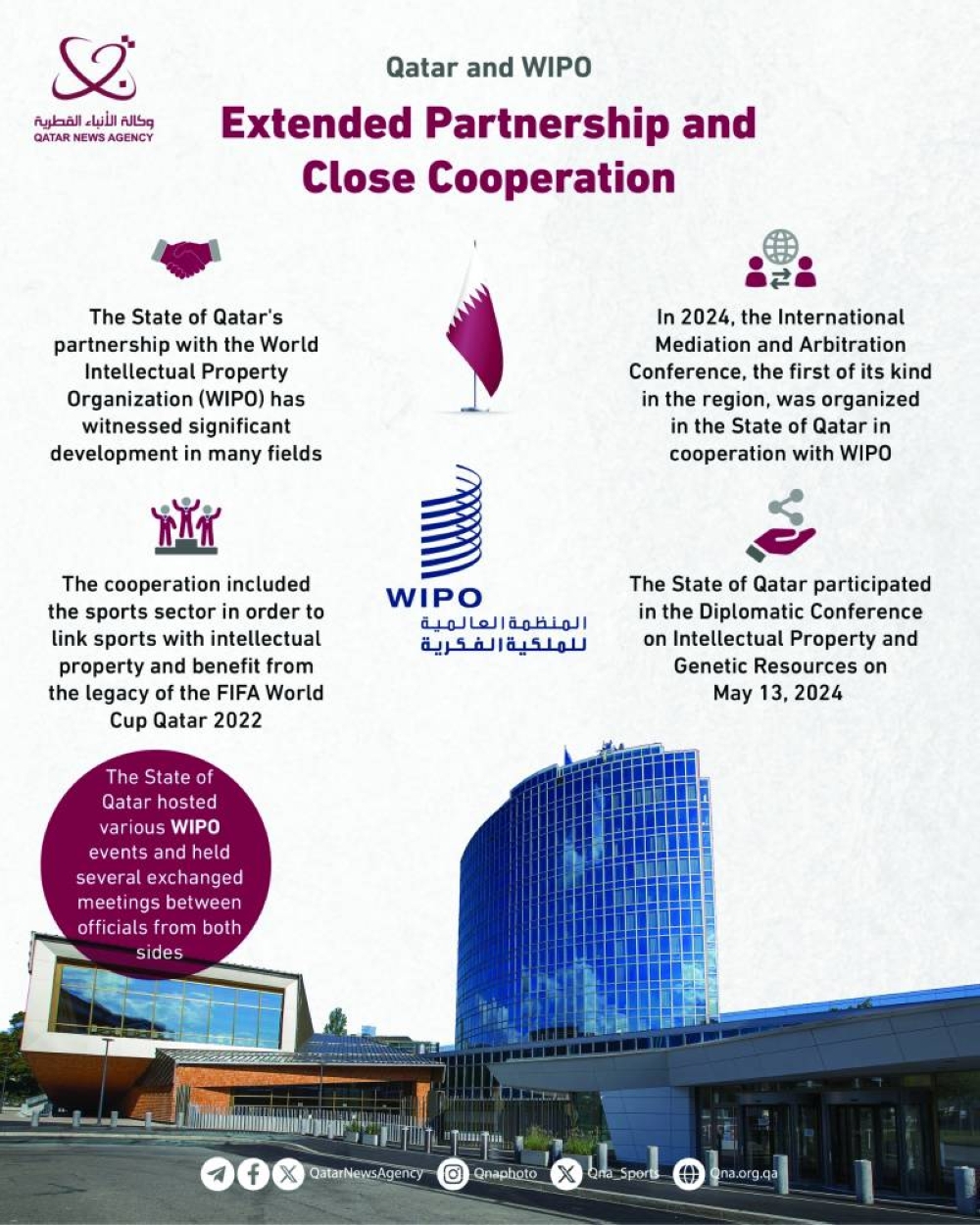Over the past few years, Qatar’s partnership with the World Intellectual Property Organisation (WIPO) has witnessed significant development in education, culture, judicial aspects, and alternative means of resolving disputes in the field of intellectual property. It also witnessed development in co-operation in the sports sector, in order to link sports with intellectual property, and benefit from the legacy of the FIFA World Cup Qatar 2022.
The partnership also included contributing to the preparation of the draft national strategy for intellectual property, which seeks to co-ordinate the state’s policies related to intellectual property, in accordance with Qatar’s national vision, as well as to evaluate the institutional framework for intellectual property in Qatar.
The most important memorandums of understanding signed between Qatar and WIPO include: an MoU regarding small and medium-sized enterprises in Qatar with the aim of enabling them to improve the use of intellectual property in their business strategies, an MoU between the Ministry of Commerce and Industry, Hamad Bin Khalifa University (HBKU) and WIPO which aims to contribute to the development of human resources in the field of intellectual property in their business strategies through teaching and developing practical skills with the participation of WIPO experts, and an MoU between the Ministry of Commerce and Industry and WIPO regarding alternative means of settling disputes in the field of intellectual property.
Accelerating Qatar’s accession to these WIPO memorandums of understanding will update the legal framework related to intellectual property in order to provide an appropriate environment for attracting investment in sectors related to the knowledge economy and enhancing confidence and legal certainty in the Qatari intellectual property system.
In sports, which is a fundamental pillar of Qatar National Vision 2030, Qatar seeks to enhance co-operation with WIPO on intellectual property and sports, as the strategic management of intellectual property rights is present at the heart of all major sports events, as was the case with the FIFA World Cup Qatar 2022, as the legacy of the World Cup will always be beneficial in terms of consolidating the relationship between intellectual property and sports in general.
In 2024, the International Mediation and Arbitration Conference was organised for the first time in Qatar, in co-operation between the Ministry of Commerce and Industry and WIPO. This conference is the first of its kind in partnership with WIPO in the region, and it aims to provide a platform for the exchange of expertise, knowledge and co-operation among specialists concerned with intellectual property rights, mediation, arbitration and foreign direct investment in the Middle East region.
A second edition of the International Mediation and Arbitration Conference will be organised in 2025 at the level of the Gulf Co-operation Council (GCC) countries, in line with the needs and emerging challenges in the region, and keeping pace with global developments in the field of mediation and arbitration of intellectual property.
In terms of activities and negotiations within WIPO committees, Qatar participated in the Diplomatic Conference on Intellectual Property, Genetic Resources and Traditional Knowledge, which was held at the organisation’s headquarters from May 13-24, 2024.
Qatar’s delegation also supported reaching a draft international legal instrument on intellectual property, genetic resources and traditional knowledge, considering that the draft constitutes an effective and balanced basis for negotiation, because it takes into account the different interests of the negotiations and allows for greater convergence of views, with the aim of narrowing the gaps and making the diplomatic conference a success.
Qatar will participate in the Diplomatic Conference for the adoption of the Design Law Treaty (DLT) in November, and it has supported Saudi Arabia’s bid to host the conference in Riyadh. The treaty aims to simplify the global system for the protection of industrial designs, making it easier for designers to protect their work in local and foreign markets. The conference represents the final stage of negotiations for this treaty, which will be followed by its final adoption.
Qatar continues to work with WIPO members to reach an agreement on the fundamental issues related to concluding a multilateral agreement that guarantees international legal protection for the rights of broadcasting organisations. Qatar also reiterated its preparedness to host the next diplomatic conference to sign this agreement, based on the country’s hope that member states will continue to show flexibility in regard to this issue.
In this context, Qatar supports the use of the Arabic language in all WIPO publications, as well as in its international intellectual property systems.
Qatar’s distinguished role was highlighted when the country won the presidency of several committees within WIPO in recent years, such as the unanimous election of Qatar to chair the Executive Committee of the International Union for the Protection of Literary and Artistic Works (Berne Union).
Qatar hosted various WIPO events and held several exchanged meetings between officials from both sides. These visits included the working visit of Assistant Director-General of WIPO Marco Alaman to Doha, on the sidelines of his participation in the International Mediation and Arbitration Conference on June 3-4, 2024.
On March 5, 2023, HE the Minister of Commerce and Industry Sheikh Mohammed bin Hamad bin Qassim al-Thani met with Director-General of WIPO Daren Tang, on the sidelines of his participation in the UN Conference on the Least Developed Countries (LDC5) in Doha. The meeting addressed co-operation and joint projects between Qatar and WIPO.
Over the past five years (2020-2024), the Qatar Research, Development and Innovation Strategy 2030, implemented by Qatar Research, Development and Innovation (QRDI) Council, has contributed to achieving several tangible successes that pushed Qatar to advance more than 20 places in the Global Innovation Index (GII) ranking in four years.

